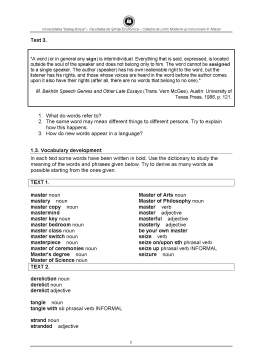Cuprins
- TABLE OF CONTENTS
- Preface 2
- UNIT ONE – COMMUNICATING IN BUSINESS 3
- UNIT TWO – PRESENTATIONS 16
- UNIT THREE – THE STRUCTURE OF THE FIRM 23
- UNIT FOUR – BUSINESS ETHICS 37
- UNIT FIVE – MANAGEMENT 47
- UNIT SIX – RECRUITMENT 59
- UNIT SEVEN – BUSINESS TRAVEL 74
- UNIT EIGHT – CULTURE AND CIVILISATION 83
- Suggested Bibliography 97
- Further Vocabulary Study 97
- Further Language Study 98
Extras din seminar
Preface
Objectives
The purpose of English for1st Year Business Students is to develop the written and oral communication skills of business students. Functional-situational in approach, the course focuses on two vital areas of the learning process: improving reading and writing skills as well as developing learning skills. The subject matter, drawn from various business fields, is provocative and timely but never too specialized. Its authors intended the textbook to be formative rather than merely summative.
Seven units are devoted to training students in the skills of reading, developing vocabulary, and writing. As students are guided through the process of learning effectively, they are able to develop communicative strategies that carry over into real-life situations. Proving essential practice in controlled exercises, the text enables students to focus on forms, functions, and the processes of written discourse. These units are designed to help students:
- Become familiar with the various vocabulary items related to business English
- Become familiar with the various expressions related to specific language functions
- Improve reading skills by focusing on both content and the use of theses expressions in task-based writing exercises
- Build up writing skills by practicing the contextual use of the vocabulary items and focusing on grammar in controlled practice exercises.
- Learn and review basic business vocabulary
The main objectives of the course are meant to be externally – oriented and internally useful. The structure of the units is systematic, concise and explicit, responsive to the variety of communicative circumstances in business. The content is formative, aiming at developing students’ awareness for the need for communicating correctly in a foreign language. Mainly designed to be used as self-study material, the book intends to encourage students to take individual study more seriously, to offer standardized exercises, to provide concrete examples, to focus on language use (knowledge of language, language skills, awareness of the nature of learning, awareness of the reading process, attitudes to reading: unknown words, strategies, ‘meaning’, opportunities for discussion/ exchanges of opinion).
The texts provide opportunities for review and expansion of the skills throughout the term. Furthermore, the units’ organisation allows the student to take advantage of individual study. The abundance of material in the texts makes them easily adaptable to varying learner interests, student specialties, and language levels. The students can select the exercises, topics, and activities that are most relevant to their needs.
UNIT ONE – COMMUNICATING IN BUSINESS
1. Communication
1.1. Lead-in
COMMUNICATION
definition:
the process by which people exchange information or express their thoughts and feelings
(Longman Dictionary of Contemporary English)
Forms and Components of Human Communication
Humans communicate in order to share knowledge and experiences. Common forms of human communication include sign language, speaking, writing, gestures, and broadcasting. Communication can be interactive, transactive, intentional, or unintentional; it can also be verbal or nonverbal. Communication varies considerably in form and style when considering scale. Internal communication, within oneself, is intrapersonal while communication between two individuals is interpersonal. At larger scales of communication both the system of communication and media of communication change. Small group communication takes place in settings of between three and 12 individuals creating a different set of interactions than large groups such as organisational communication in settings like companies or communities. At the largest scales mass communication describes communication to huge numbers of individuals through mass media. Communication also has a time component, being either synchronous or asynchronous. There are a number of theories of communication that attempt to explain human communication. However, various theories relating to human communication have the same core philosophy. Communication follows a five-step process, which begins with the creation of a message and then sending it to another individual, organisation or a group of people. This message is received and then interpreted. Finally this message is responded to, which completes the process of communication.
(http://en.wikipedia.org/wiki/Communication)
Answer the following questions:
What possible barriers to interpersonal communication can you identify?
How can people communicate in international contexts where people speak different languages?
What language is mainly used in international communication? Why?
1.2. Reading
Read the following short texts referring to communication and answer the questions that follow.
Text 1.
"Have you ever said to yourself, "I wish I had spoken up"? Or, "If only I had introduced myself"? Or, "Did I say the wrong thing"?
Conversational Confidence is the answer. Just by listening, you'll master the proven interpersonal skills you need to deal with every individual, every group, every occasion.
The result? New doors will open to you. You won't hesitate to accept an invitation, to approach someone important, to seize an opportunity. You'll never again feel like an outsider. Success will naturally flow your way--and with less effort than you ever imagined possible."
~verbalAdvantage (advertisement in The New Republic, March 12, 2001)
1. Why are people sometimes reluctant to speak up their minds?
2. What is the role of listening in a conversation?
3. How can people develop their communication skills?
Preview document
Conținut arhivă zip
- Suport Seminar Engleza FSEGA.doc











































































































